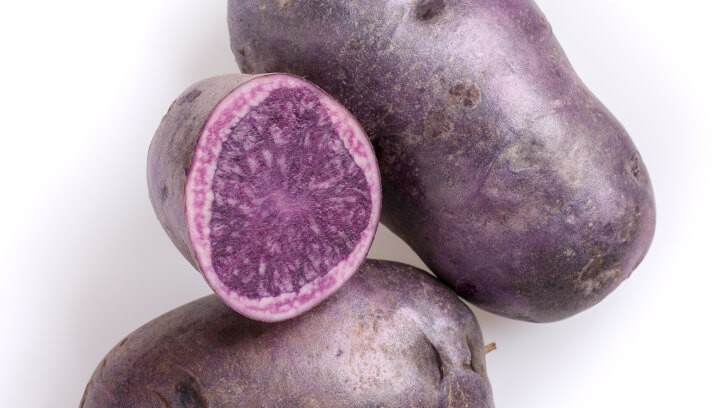Purple potatoes may combat the effects of environmental pollutants

“To our knowledge, this is the first study investigating the impact of PCBs on human associated gut microbiota profile and production of short chain fatty acids (SCFAs) in a batch culture fermentation system,” the researchers wrote. “This is also the first study assessing the protective effects of anthocyanin-rich potato meals on PCB-induced disruption of gut microbiota and the production of SCFAs.”
The research, published in the journal Frontiers in Nutrition, was supported by a Natural Sciences and Engineering Research Council of Canada grant and collaboration from the Rosell Institute for Microbiome and Probiotics.
PCBs, ACNs and gut microbial diversity
Polychlorinated biphenyls (PCBs) are industrial chemicals associated with a wide variety of adverse health outcomes, with humans predominantly exposed to PCB 126 and PCB 153 through the food chain. Although banned since 1979 due to their environmental and human toxicity, PCBs can still be found at measurable levels in the environment and in human tissues and plasma.
“Emerging studies have suggested that PCB exposure leads to lower gut microbial diversity although their effects on microbial production of health promoting short-chain fatty acids (SCFAs) has been scarcely studied,” the researchers noted, adding that exposure has been shown to increase the risk of metabolic disorders including obesity, type 2 diabetes, and liver diseases.
As such, they set out to assess how PCB 126 and PCB 153 deleteriously alter human gut microbiota composition and SCFA production and whether the purple-fleshed Russian Blue potato cultivar might guard against these harmful effects.
“Blue potatoes are rich in anthocyanins (ACNs), which is a class of polyphenols that promote the growth of beneficial intestinal bacteria such as Bifidobacterium and Lactobacillus and increase the generation of SCFAs,” they noted.
Study details
The study was carried out in an in vitro simulated gut digestion model involving upper gastrointestinal digestion followed by metabolism by human fecal microbiota. The computer-controlled batch culture fermentation system simulates the oral to colonic conditions, running five fermentation reactors at once.
Ground freeze-dried potato meals (11.03 g) were digested over 12 hours with and without PCB 126 (0.5 mM) and PCB 153 (0.5 mM). Fecal digests were then collected for analysis of gut microbial and SCFA profiles.
“Human fecal matter exposed to PCB 126 and PCB 153 led to decreased abundance and altered gut microbiota profiles as well as lowered SCFA and acetate levels,” the study concluded. “Importantly, this study showed that prebiotic ACN-rich potatoes counteract PCB-mediated disruptions in human gut microbiota profiles and SCFA production.”
PCB treatment was associated with an increased relative abundance of Akkermansia, Eggerthella, and Bifidobacterium and a decreased relative abundance of Veillonella, Streptococcus, and Holdemanella. Despite the presumed health-promoting properties of Akkermansia and Bifidobacterium, the study noted that “an increased abundance of these species may not always benefit the host”. (Overgrowth of Akkermansia has been associated with a thinner mucin layer and risk of inflammation; increased abundance of Bifidobacterium with irritable bowel disease; and too much Eggerthella with an increased risk of colonic infection and colon cancer.)
Meanwhile, study findings indicated that ACN digests counteracted the altered abundances of Akkermansia and Bifidobacterium seen with the PCB treatment.
The researchers suggest that future studies investigate whether inter-individual variability in gut microbiota composition leads to variations in the health benefits of anthocyanin-rich potato meals, including their protective effects against PCB-induced gut microbiota dysbiosis.
Source: Frontiers in Nutrition
“Anthocyanin-rich blue potato meals protect against polychlorinated biphenyl-mediated disruption of short-chain fatty acid production and gut microbiota profiles in a simulated human digestion model”
doi: doi.org/10.3389/fnut.2023.1130841
Authors: Fang Lu et al.





